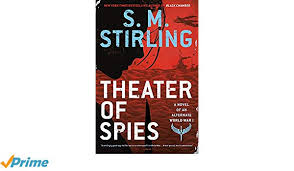I am currently rereading Poul Anderson's second Rustum volume, which takes us forwards in time, and reading SM Stirling's second Black Chamber volume, which takes us backwards and sideways in time. (Also other works but let's stay focused.)
In Theater Of Spies, look out for more lovingly described meals (of course). I will not (yet) reproduce the menus here although I have frequently done so before.
Regular readers might remember that I am a pov cop. Pov is narrative point of view. A pov cop is sensitive to any changes in pov or to any apparent breaches of the usually accepted conventions for controlling and presenting povs. We are familiar with first person pov, second person pov and omniscient narrator. The culminating story in Brian Aldiss' single-volume future history has a second person pov:
"You never knew..."
-Brian Aldiss, Galaxies Like Grains Of Sand (London, 1979), NINE, THE ULTIMATE MILLENNIA, p. 157.
- and I attempted a narrative with a second person pov on a smaller scale here.
The omniscient narrator might be appropriate to describe an event like a supernova that had happened long before there were any observers. However, in the opening passage of Mirkheim, Poul Anderson writes:
"There may have been lesser worlds and moons; we cannot now say. We simply know that the giant stars rarely have attendants..."
-Poul Anderson, Mirkheim IN Anderson, Rise Of The Terran Empire (Riverdale, NY, 2011), pp. 1-291 AT Prologue, Y minus 500,000, p. 1.
Thus, this narrator not only acknowledges that he is not omniscient but also identifies himself as one scientifically informed member of Technic civilization addressing fellow members.
The shortest unit of continuous narrative is a section either of a short story or of a chapter in a novel, e.g., Y minus 500,000 is the opening section of Prologue. The second section, Y minus 28, beginning on p. 2, is a third person narrative with Benoni Strang as its pov character.
The usual convention is that each section has a single pov. In Theater Of Spies, look out for a chapter that is narrated from Luz's third person pov but that ends with the omniscient narrator describing a third party observing both Luz and Ciara. We are not given the third party's pov but we are told that he is watching without Luz's knowledge.
For CS Lewis' extraordinary stunts with povs, see The Ransom Trilogy.

5 comments:
Kaor, Paul!
That interests me, a third person is watching Luz and Ciara without them knowing it. I can easily imagine how much Horst von Duckmeler would like to do that as he prepared to POUNCE on them!
Sean
that's "von Duckler", with an umlaut on the 'u'.
Kaor, Mr. Stirling!
I noticed that, but my keyboard doesn't have an umlaut key.
Sean
One of the benefits of 3rd-person past as a narrative technique is that you can, sometimes, use it to "flare out" and give a broader picture after using it in tight focus. You have to be careful when doing that, of course.
Kaor, Mr. Stirling,
I think that, by and large, you use this third person past narrative technique very well.
Sean
Post a Comment